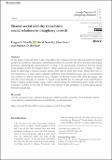Shared social identity transforms social relations in imaginary crowds
Abstract
In this paper we present three studies that address the difference between physical and psychological groups, the conditions which create a transformation from the one into the other, and the psychological processes underlying this transformation. In Study 1 we demonstrate correlations between shared social identity, desired physical proximity to others and positive emotions in the company of others. Study 2, employing a between-subjects design, finds that an event which creates shared fate, such as the breakdown of a train, leads to greater comfort in social interactions (e.g. ease of conversation) and comfort in sensual interactions (e.g. tolerance of the physical touch) with other passengers, and that this occurs through an increase in shared social identity but not through social identification. Study 3 obtains similar findings using a within-subjects design. In combination, these studies provide consistent evidence for the role of shared social identity in the emergence of psychological from physical groups.
Citation
Neville , F G , Novelli , D , Drury , J & Reicher , S D 2020 , ' Shared social identity transforms social relations in imaginary crowds ' , Group Processes and Intergroup Relations , vol. Online First . https://doi.org/10.1177/1368430220936759
Publication
Group Processes and Intergroup Relations
Status
Peer reviewed
ISSN
1368-4302Type
Journal article
Description
This research was supported by ESRC Postgraduate Studentships for the first (PTA-030-200600100) and second authors (PTA-031-200500096), and an ESRC research grant for the third and fourth authors (ES/N01068X/1).Collections
Items in the St Andrews Research Repository are protected by copyright, with all rights reserved, unless otherwise indicated.
Related items
Showing items related by title, author, creator and subject.
-
Strength in a weakened state : interpreting Hizb’allah’s experiences as a social movement and governing coalition in Lebanon 1985-2013
Bernhoff, Arthur (University of St Andrews, 2015-06-23) - ThesisThis study investigates Hizb’allah’s successful but competing dual development as an extra-institutional Shi’a social movement and an institutional political party. Hizb’allah has traditionally been studied from the ... -
Radical social innovations and the spatialities of grassroots activism : navigating pathways for tackling inequality and reinventing the commons
Apostolopoulou, Elia; Bormpoudakis, Dimitrios; Chatzipavlidis, Alexandros; Cortés Vázquez, Juan José; Florea, Ioana; Gearey, Mary; Levy, Julyan; Loginova, Julia; Ordner, James; Partridge, Tristan; Pizarro Choy, Alejandra; Rhoades, Hannibal; Symons, Kate; Veríssimo, Céline; Wahby, Noura (2022-04-05) - Journal articleIn this article, by drawing on empirical evidence from twelve case studies from nine countries from across the Global South and North, we ask how radical grassroots social innovations that are part of social movements and ... -
Wellbeing and social network characteristics in rural communities : findings from a cohort in social housing in Cornwall, United Kingdom
Long, Emily; Stevens, Sebastian; Topciu, Raluca; Williams, Andrew James; Taylor, Timothy; Morrissey, Karyn (2022-05-19) - Journal articleBackground: The mental wellbeing of those living in resource poor and rural localities is a public health priority. Despite evidence of a link between social networks and mental wellbeing, little is known about this ...

